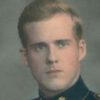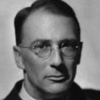Shrapnel wounds and mangled, bullet ridden bodies are not the only casualties of war. There are casualties of the mind. Every war produces a backwash, a residue of pain and grief.
Rod Serling (1924-1975) American screenwriter, playwright, television producer, narrator
Comment, Antioch College (c. 1965)
(Source)
As quoted in Anne Serling, As I Knew Him: My Dad, Rod Serling (2013).
Quotations about:
casualties
Note not all quotations have been tagged, so Search may find additional quotes on this topic.
Sitting in stunned silence, we remembered our dead. So many dead. So many maimed. So many bright futures consigned to the ashes of the past. So many dreams lost in the madness that had engulfed us. Except for a few widely scattered shouts of joy, the survivors of the abyss sat hollow-eyed and silent, trying to comprehend a world without war.
E. B. Sledge (1923-2001) American soldier, biologist, academic, memoirist [Eugene Bondurant Sledge]
With the Old Breed at Peleliu and Okinawa (1981)
On the reaction of his fellow Marines to the announcement of the Japanese surrender in WWII.
Paul Fussell quotes this passage in his essay "Thank God for the Atom Bomb," The New Republic (26 Aug 1981), and it is sometimes misattributed to him.
There was a price to be paid; the dominion of the seas was not given freely by destiny. The Channel Fleet paid in blood, in lives, as well as in the sacrifice of the freedom and leisure of every officer and man on board. There was a constant petty drain. Ordinary sickness took only small toll; among men in the prime of life isolated from the rest of the world illnesses were few, although it was noticeable that after the arrival of victualling ships from England epidemics of colds would sweep through the fleet, while rheumatism — the sailor’s disease — was always present. The losses were mainly due to other causes. There were men who, in a moment of carelessness or inattention, fell from the yard. There were the men who ruptured themselves, and they were many, for despite the ingenuity of blocks and tackles there were heavy weights to haul about by sheer manpower. There were crushed fingers and crushed feet when ponderous casks of salted provisions were lowered into boats from the storeships and hauled up on to the decks of the fighting ships. And frequently a lacerated limb would end — despite all the care of the surgeons — in gangrene, in amputation, and death. There were the careless men who, during target practice with the cannon, lost their arms by ramming a cartridge into an improperly sponged gun, or who did not remove themselves from the line of recoil. Three times that year there were men who died in quarrels, when boredom changed to hysteria and knives were drawn; and on each of those occasions another life was lost, a life for a life, a hanging with the other ships clustered round and the crews lining the sides to learn what happened when a man lost his temper. And once the crews manned the sides to see what happened when a wretched young seaman paid the price for a crime worse even than murder — for raising his fist to his superior officer. Incidents of that sort were inevitable as the ships beat back and forth monotonously, over the eternal grey inhospitable sea.
C. S. Forester (1899-1966) English novelist [Cecil Scott Forester, pen name for Cecil Louis Troughton Smith]
Hornblower and the Hotspur (1962)
(Source)
I am oppressed with a sense of the impropriety of uttering words on this occasion. If silence is ever golden, it must be here, beside the graves of fifteen thousand men, whose lives were more significant than speech, and whose death was a poem, the music of which can never be sung. With words we make promises, plight faith, praise virtue. Promises may not be kept, plighted faith may be broken, and vaunted virtue be only the cunning mask of vice. We do not know one promise these men made, one pledge they gave, one word they spoke: but we do know they summed up and perfected, by one supreme act, the highest virtues of men and citizens. For love of country they accepted death, and thus resolved all doubts, and made immortal their patriotism and their virtue. For the noblest man that lives, there still remains a conflict. He must still withstand the assaults of time and fortune, must still be assailed with temptations, before which lofty natures have fallen; but with these the conflict ended, the victory was won, when death stamped on them the great seal of heroic character, and closed a record which years can never blot.
James A. Garfield (1831-1881) US President (1881), lawyer, lay preacher, educator
Speech at Arlington National Cemetery, Decoration Day (30 May 1868)
(Source)
A speech by Garfield, then a Congressman and a former Union Major General in the Civil War, for the first Decoration Day (later Memorial Day) ceremonies.
Croesus said to Cambyses: That peace was better than war; because in peace the sons did bury their fathers, but in wars the fathers did bury their sons.
Francis Bacon (1561-1626) English philosopher, scientist, author, statesman
Apophthegms, #149 (1625)
See Herodotus.





